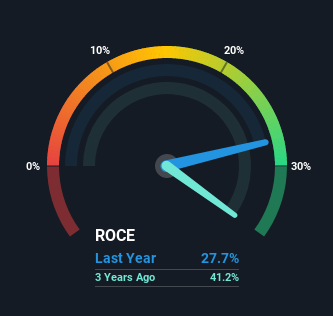- United States
- /
- IT
- /
- NYSE:ACN
Accenture (NYSE:ACN) Might Be Having Difficulty Using Its Capital Effectively

If we want to find a potential multi-bagger, often there are underlying trends that can provide clues. Typically, we'll want to notice a trend of growing return on capital employed (ROCE) and alongside that, an expanding base of capital employed. Put simply, these types of businesses are compounding machines, meaning they are continually reinvesting their earnings at ever-higher rates of return. So when we looked at Accenture (NYSE:ACN), they do have a high ROCE, but we weren't exactly elated from how returns are trending.
What is Return On Capital Employed (ROCE)?
Just to clarify if you're unsure, ROCE is a metric for evaluating how much pre-tax income (in percentage terms) a company earns on the capital invested in its business. To calculate this metric for Accenture, this is the formula:
Return on Capital Employed = Earnings Before Interest and Tax (EBIT) ÷ (Total Assets - Current Liabilities)
0.28 = US$7.6b ÷ (US$43b - US$16b) (Based on the trailing twelve months to August 2021).
Therefore, Accenture has an ROCE of 28%. In absolute terms that's a great return and it's even better than the IT industry average of 14%.
See our latest analysis for Accenture

Above you can see how the current ROCE for Accenture compares to its prior returns on capital, but there's only so much you can tell from the past. If you'd like, you can check out the forecasts from the analysts covering Accenture here for free.
The Trend Of ROCE
In terms of Accenture's historical ROCE movements, the trend isn't fantastic. To be more specific, while the ROCE is still high, it's fallen from 41% where it was five years ago. Although, given both revenue and the amount of assets employed in the business have increased, it could suggest the company is investing in growth, and the extra capital has led to a short-term reduction in ROCE. And if the increased capital generates additional returns, the business, and thus shareholders, will benefit in the long run.
The Bottom Line On Accenture's ROCE
In summary, despite lower returns in the short term, we're encouraged to see that Accenture is reinvesting for growth and has higher sales as a result. And the stock has done incredibly well with a 220% return over the last five years, so long term investors are no doubt ecstatic with that result. So should these growth trends continue, we'd be optimistic on the stock going forward.
Accenture could be trading at an attractive price in other respects, so you might find our free intrinsic value estimation on our platform quite valuable.
If you'd like to see other companies earning high returns, check out our free list of companies earning high returns with solid balance sheets here.
New: Manage All Your Stock Portfolios in One Place
We've created the ultimate portfolio companion for stock investors, and it's free.
• Connect an unlimited number of Portfolios and see your total in one currency
• Be alerted to new Warning Signs or Risks via email or mobile
• Track the Fair Value of your stocks
Have feedback on this article? Concerned about the content? Get in touch with us directly. Alternatively, email editorial-team (at) simplywallst.com.
This article by Simply Wall St is general in nature. We provide commentary based on historical data and analyst forecasts only using an unbiased methodology and our articles are not intended to be financial advice. It does not constitute a recommendation to buy or sell any stock, and does not take account of your objectives, or your financial situation. We aim to bring you long-term focused analysis driven by fundamental data. Note that our analysis may not factor in the latest price-sensitive company announcements or qualitative material. Simply Wall St has no position in any stocks mentioned.
About NYSE:ACN
Accenture
Provides strategy and consulting, industry X, song, and technology and operation services in North America, Europe, the Middle East, Africa, and internationally.
Very undervalued with outstanding track record and pays a dividend.
Similar Companies
Market Insights
Community Narratives



